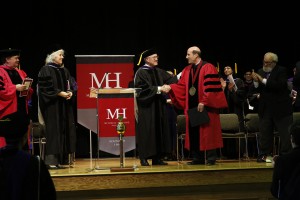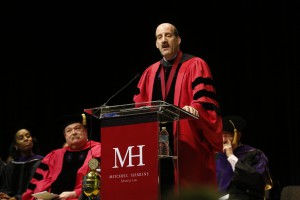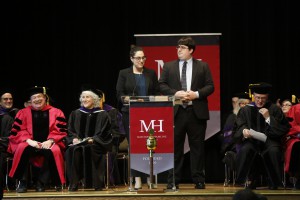Mark Gordon was installed as the first president and dean of Mitchell Hamline School of Law Tuesday, April 12, marking a new chapter for the recently combined institution and its rich legacy in the legal community.
Participants in the evening ceremony included Minnesota Supreme Court Chief Justice Lorie Gildea, St. Paul Mayor Chris Coleman, former St. Paul Mayor and former Hamline Law Dean George Latimer, Hamline University President Dr. Fayneese Miller, as well as Mitchell Hamline faculty and staff, the school’s board of trustees, numerous alumni, students, members of the judiciary, and representatives from several other academic institutions.
Mark Gordon took over as president and dean at William Mitchell College of Law in July 2015 and led the combination process with Hamline University School of Law that created Mitchell Hamline in December 2015.
Gordon said he feels fortunate to be named the first-ever leader of Mitchell Hamline.
“I know that I stand on the shoulders of the great and dedicated leaders of this school who have come before me,” he said.
Video: Mitchell Hamline community welcomes Mark Gordon
Dean Gordon was formerly president of Defiance College and dean of the University of Detroit Mercy School of Law. He served as an associate professor at Columbia University and worked in government both under President Bill Clinton and New York Governor Mario Cuomo. He graduated magna cum laude from Harvard Law School.
Gordon has been recognized as an innovative educator and energetic public servant for nearly three decades, and he promised to continue those efforts at Mitchell Hamline.
He outlined his plans for Mitchell Hamline to be a national leader in redesigning legal education, redefining the role of the law school in the community, renewing faith and passion for government service among law school graduates, and reclaiming the legal profession’s role as a voice for the voiceless.
And he re-asserted the school’s tradition of producing excellence through opening up access to legal education, not by restricting it.
“It is for us to remind people that the measure of an educational institution should not be related to how effectively it admits only the few, but rather the extent to which it broadens opportunity for those who attend,” Gordon said.



